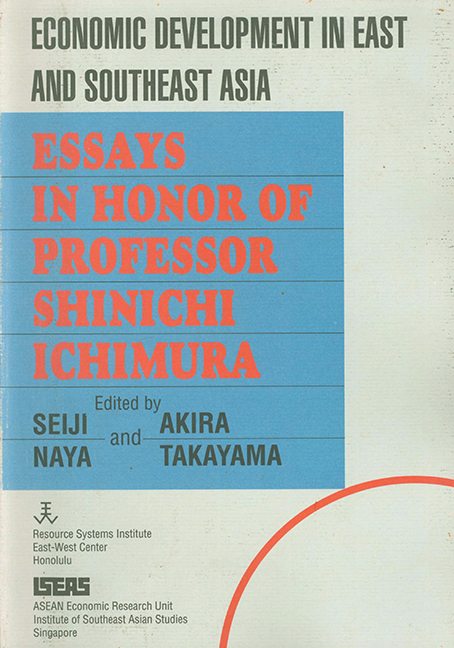Book contents
- Frontmatter
- Preface
- Shinichi Ichimura, 1925-
- CONTENTS
- Introduction
- Contributors to This Volume
- I Structural Change and Economic Development in Developing Asia in the 1990s
- II Explaining the Success of the Four Little Dragons: A Survey
- III Taiwan's Economic Miracle: A Singaporean Perspective
- IV Singapore's Experience of Industrial Restructuring: Lessons for the Other Asian NIEs
- V Korean Industrial Policies for Declining Industries
- VI Vietnam: Recent Economic Developments and the World Economy
- VII Transition from Import Substitution to Export Expansion: The Thai Experience
- VIII Adjustment Problems of a Small Oil-Exporting Country: Did Indonesia Suffer from the Dutch Disease?
- IX A Quarterly Econometric Model of the Hong Kong Economy
- X The Effect ofRicardian Rent Extracting on Macroeconomic Performance
- XI Direct Foreign Investment and the Economic Development of Korea
- XII Japanese Investment in Thailand: Looking Back and Into the Future
- XIII The Effects of Direct Foreign Investment on Taiwan: A Macroeconometric Investigation
- XIV A Reform of the Foward Foreign Exchange Market and Foreign Exchange Rate Determination Policy in Korea, with Foreign Exchange Policy Experiences of Taiwan
- XV Interest Rate and Foreign Exchange Liberalization in Taiwan in the 1980
- XVI Manifold Dilemmas behind External Debt Management
- XVII Agricultural Growth and Food Imports in Developing Countries: A Reexamination
- XVIII The Transformation of Rural Asia and Economic Development Theory and Policy
- XIX The ASEAN Summit and ASEAN Economic Cooperation
- XX The Role of Developing Countries in the New GATT Round
- XXI The Emerging Global Economy and the Role of the Asian NIEs
- Index
Shinichi Ichimura, 1925-
Published online by Cambridge University Press: 21 October 2015
- Frontmatter
- Preface
- Shinichi Ichimura, 1925-
- CONTENTS
- Introduction
- Contributors to This Volume
- I Structural Change and Economic Development in Developing Asia in the 1990s
- II Explaining the Success of the Four Little Dragons: A Survey
- III Taiwan's Economic Miracle: A Singaporean Perspective
- IV Singapore's Experience of Industrial Restructuring: Lessons for the Other Asian NIEs
- V Korean Industrial Policies for Declining Industries
- VI Vietnam: Recent Economic Developments and the World Economy
- VII Transition from Import Substitution to Export Expansion: The Thai Experience
- VIII Adjustment Problems of a Small Oil-Exporting Country: Did Indonesia Suffer from the Dutch Disease?
- IX A Quarterly Econometric Model of the Hong Kong Economy
- X The Effect ofRicardian Rent Extracting on Macroeconomic Performance
- XI Direct Foreign Investment and the Economic Development of Korea
- XII Japanese Investment in Thailand: Looking Back and Into the Future
- XIII The Effects of Direct Foreign Investment on Taiwan: A Macroeconometric Investigation
- XIV A Reform of the Foward Foreign Exchange Market and Foreign Exchange Rate Determination Policy in Korea, with Foreign Exchange Policy Experiences of Taiwan
- XV Interest Rate and Foreign Exchange Liberalization in Taiwan in the 1980
- XVI Manifold Dilemmas behind External Debt Management
- XVII Agricultural Growth and Food Imports in Developing Countries: A Reexamination
- XVIII The Transformation of Rural Asia and Economic Development Theory and Policy
- XIX The ASEAN Summit and ASEAN Economic Cooperation
- XX The Role of Developing Countries in the New GATT Round
- XXI The Emerging Global Economy and the Role of the Asian NIEs
- Index
Summary
Professor Shinichi Ichimura was born in Kyoto, Japan in 1925. After being graduated from the Department of Indonesian Languages, Osaka College of Foreign Languages in 1941, he entered and was graduated from the Faculty of Economics, Kyoto University in 1949. After graduate work in economics at Columbia University in 1950-51, he moved to the graduate program at the Massachusetts Institute of Technology, where he obtained a Ph.D. in Economics in 1953. In 1963, he was awarded a Doctor of Economics (under the old system) from Osaka University.
His professional life so far may be divided into two parts. In the first period, Professor Ichimura was a member of the faculty of Wakayama University (Faculty of Economics) from 1949-56, and of Osaka University (Institute of Social and Economic Research) from 1956-68. During this period he also taught at Johns Hopkins University (1959-60), the University of California at Berkeley (1965-66), and the University of Pennsylvania (1966-67). His interests during this time included both the theoretical and empirical aspects of the then current economic issues including studies on related goods, consumer surplus, nonlinear business cycle theories, national income analysis, demand and suppy of money, international trade, and input-output analysis, and the Japanese economy. He produced a number of professional articles and books on these subjects both in English and in Japanese. In the course of this first period, his interest shifted from theoretical research to empirical studies and began to focus more on the Japanese economy. Furthermore, in 1963, he was elected Fellow of the Econometric Society, and was coeditor of Economics Studies Quarterly from 1960-65.
His move to the Center for Southeast Asian Studies at Kyoto University in 1968 signals the beginning of the second period of his professional life. At this time his interests changed dramatically and shifted to the study of the Southeast Asian economies. His research encompasses such topics as regional economic research on South Sumatra, agricultural development and the green revolution, the effect of climatic factors on the socio-economic structure of Southeast Asian countries, Japanese joint-ventures in Southeast Asia, cultural conflicts and labor-management relations, cultural and institutional factors and appropriate technology, economic development of Indonesia, the scope of economic development of Asia, political aspects of development policies, and debt accumulation in connection with the North-South problem.
- Type
- Chapter
- Information
- Economic Development in East and Southeast AsiaEssays in Honor of Professor Shinichi Ichimura, pp. vii - xPublisher: ISEAS–Yusof Ishak InstitutePrint publication year: 1990

